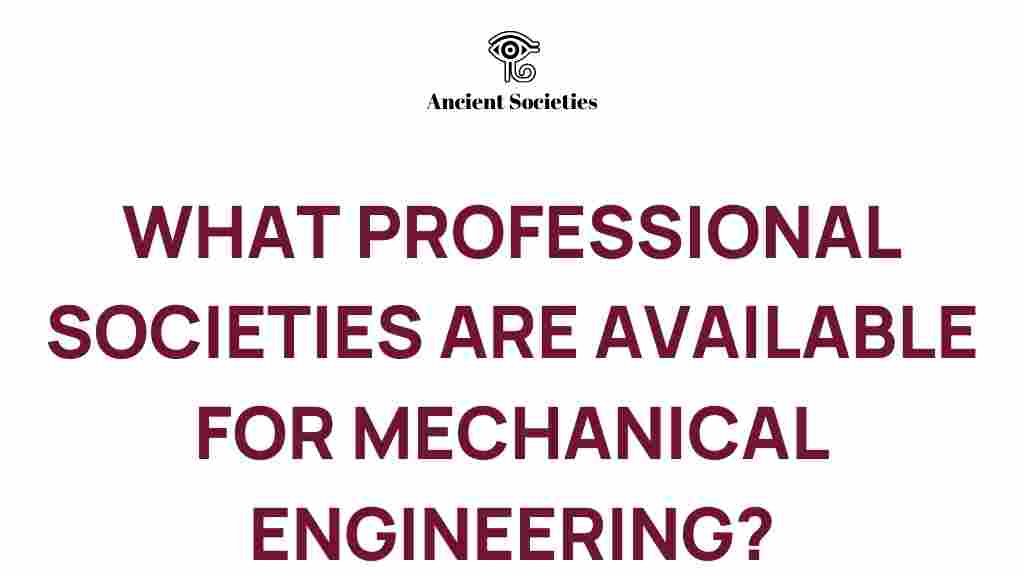Unlocking Opportunities: Explore Professional Societies in Mechanical Engineering
In today’s competitive landscape, mechanical engineering professionals must leverage every available resource to advance their careers. One of the most effective ways to do this is by engaging with professional societies in mechanical engineering. These organizations provide a plethora of opportunities for networking, career development, and access to the broader engineering community. In this article, we will explore the benefits of joining professional societies, how to get involved, and the resources they offer, including certifications, mentorship, and industry standards.
The Importance of Professional Societies in Mechanical Engineering
Professional societies serve as a backbone for mechanical engineering professionals, fostering growth and development through various means. Here are some key reasons to consider joining:
- Networking Opportunities: Engage with peers, industry leaders, and potential employers.
- Career Development: Access workshops, seminars, and conferences to enhance your skills.
- Industry Standards: Stay updated on the latest standards and practices in mechanical engineering.
- Certifications: Gain credentials that can set you apart in the job market.
- Resources: Utilize research papers, publications, and online databases.
- Mentorship: Connect with experienced professionals who can guide your career path.
Finding the Right Professional Society
With numerous professional societies available, selecting the right one for your needs is crucial. Here’s how to go about it:
- Identify Your Goals: Consider what you wish to achieve—networking, learning, or gaining certifications.
- Research Societies: Look into various organizations like the American Society of Mechanical Engineers (ASME) or the Society of Automotive Engineers (SAE).
- Evaluate Membership Benefits: Review what each society offers—events, publications, and resources.
- Consider Local Chapters: Many societies have local chapters that provide additional networking opportunities.
- Join Online Communities: Many societies have forums and social media groups that facilitate ongoing discussions.
Engaging with Professional Societies
Once you’ve selected a professional society, here are steps to maximize your engagement:
- Become a Member: Complete the membership application process and pay any associated fees.
- Attend Events: Participate in workshops, seminars, and conferences to meet people and learn.
- Volunteer: Offer your time for committees or events to gain experience and visibility.
- Access Resources: Use the society’s library, journals, and online resources to deepen your knowledge.
- Seek Mentorship: Reach out to seasoned professionals for guidance.
Networking: Building Connections in the Engineering Community
Networking is one of the most significant advantages of joining a professional society. Here are some tips to enhance your networking experience:
- Be Active: Attend as many events as possible and engage in conversations.
- Follow Up: After meeting someone, send a follow-up email to reinforce the connection.
- Utilize Social Media: Connect with fellow members on platforms like LinkedIn to expand your professional network.
- Participate in Online Forums: Engage in discussions to share ideas and learn from others.
Career Development Through Certifications
Certifications are a valuable way to demonstrate your expertise and commitment to your field. Here are some common certifications available through professional societies:
- Certified Manufacturing Engineer (CMfgE): Offered by the Society of Manufacturing Engineers, this certification validates your knowledge in manufacturing processes.
- Professional Engineer (PE): A widely recognized credential that signifies a high level of competence in engineering.
- Lean Six Sigma Certification: Focused on quality management and process improvement, this certification is beneficial in various industries.
- Certified Maintenance and Reliability Technician (CMRT): This certification is ideal for those involved in maintenance and reliability engineering.
Check with the specific professional societies you are interested in for more information on their certification programs.
Accessing Valuable Resources
Professional societies offer a wealth of resources that can aid in your career development. These include:
- Research Publications: Stay updated on the latest studies and advancements in mechanical engineering.
- Technical Standards: Access standards that guide engineering practices and ensure quality.
- Webinars and Online Courses: Participate in educational opportunities from the comfort of your home.
- Job Boards: Many societies maintain job boards exclusively for their members.
Finding a Mentor
Mentorship can dramatically impact your career trajectory. Here’s how to find a mentor through professional societies:
- Express Interest: Attend events where experienced professionals are present and express your interest in finding a mentor.
- Join Mentoring Programs: Many societies have formal mentoring programs that pair young engineers with seasoned professionals.
- Build Relationships: Develop relationships with individuals you admire and seek their guidance.
- Stay Committed: Once you find a mentor, be proactive in scheduling meetings and discussing your goals.
Troubleshooting Networking Challenges
Networking can sometimes feel daunting. Here are some troubleshooting tips to overcome common challenges:
- Feeling Shy: Prepare conversation starters beforehand to ease into discussions.
- Limited Events: If local events are scarce, participate in online meetings and webinars.
- Finding Common Interests: Research attendees or speakers in advance to find mutual topics of interest.
- Time Constraints: Prioritize events that align with your career goals, even if they are infrequent.
Conclusion
Joining professional societies in mechanical engineering is a strategic move for anyone looking to enhance their career. These organizations not only provide essential networking opportunities but also foster career development through access to resources, certifications, and mentorship. By actively engaging with the engineering community, you can stay current with industry standards and develop the skills necessary to thrive. Embrace the opportunities that professional societies offer and take the next step in your mechanical engineering career.
For more insights and resources specific to mechanical engineering, visit the American Society of Mechanical Engineers (ASME). To explore additional engineering communities and resources, check out Engineering.com.
This article is in the category Society and created by AncientSocieties Team
